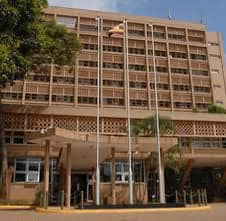By Denis Jjuuko
It is 10.00am somewhere in Abidjan or Washington. The boardroom is well set up. The temperature is on point, to use Kampala language, and with the press of a button, the microphones become red hot and the giant screen is switched on. In the room, are several government officials from Uganda.
They are meeting executives from the African Development or the World Bank to convince them to lend money to Uganda to implement its various development projects that will improve people’s livelihoods and catapult the country to some level of middle-income status. The Uganda delegation did their homework as exhibited in the colorful spreadsheets, graphs and photos in the presentation. Using persuasive language, the Uganda delegation is making an impassioned plea to the lenders to advance the money as soon as possible or else millions of people will become poorer than they are today.
The executives from the lending institutions nod their heads. The Uganda delegation has been impressive. It doesn’t surprise them though. These are some of Uganda’s brightest minds. They know their stuff. They are passionate about their country. The only thing missing is money. You know, some people say money is not everything, it is the only thing! If the money is advanced, the country would indeed consolidate the gains made already over the last few years.
At the end of the question-and-answer session, the lending executives propose a break followed by a breakout session for themselves. The Uganda delegation can wait a bit in the executive lounge as they take in the executive views of the city and catch up with their families and work emails back home.
Within a few minutes, the lenders have made a decision and have called the Uganda delegation back to the boardroom. The Uganda delegation is a bit anxious but they know the loans will be advanced. The lender is also in business, they will be earning interest. The problem is usually on interest rate, loan period and payment terms. Small issues that could be easily agreed upon.
Anyway, in the boardroom, the lenders agree to advance the loan. Terms have been easily agreed upon and with consultation back in Kampala, the agreement will be signed within a few weeks. Indeed, the loan agreement is signed and the lenders advance the money.
All is good for Uganda, right? Not really. And that is where as an ordinary Ugandan you should get concerned. According to the Auditor General’s report, Uganda’s unused loans have jumped 12.95% as of June 2024 to a monstruous Shs14.6 trillion. Yep, Shs14.6 trillion or nearly US$4 billion. In the last six years up to June 2024, Uganda has been spending a cool Shs78.2b annually on such loans. That is some Shs469 billion on unused loans.
Yet many infrastructural projects such as roads are stalled because, we are constantly reminded, that there is no money. Projects that would have been completed on time take years because there is no money yet we have Shs14.6 trillion in some bank vaults waiting for us to collect and pay off contractors.
Suppliers to the Uganda government have had their assets sold by commercial banks because we have failed to pay their invoices. Their workers have become unemployed. Kids’ education has been affected. The suppliers can’t be paid but Shs14.6 trillion of loans is not being utilized.
If projects are not ready, why do we go and beg for these loans? At least if we don’t get the loans we are not ready to utilize, we would save Shs78.2b annually, which we would use to work on our projects debt free. How can a poor country be enriching the lenders?
Imagine a businessman who goes and borrows money from a commercial bank and then leaves it there while paying annually to have the money on their account and not utilizing it. And then that businessman wouldn’t stop there, he would still go to another lender in another city and borrow and leaves the money on account unutilized. Imagine what would happen to that businessman over the years.
Imagine if the Uganda government was a businessman, they would have collapsed already, assets sold on auction and the businessman dead of heart attack or somewhere in intensive care. Even though the Uganda government isn’t a typical businessman and can survive for years by borrowing money they don’t utilize, it will still affect it and more so the citizens.
With the Americans freezing their aid, it is time the government of Uganda utilized the Shs14.6 trillion to spur economic growth.
The writer is a communication and visibility consultant. djjuuko@gmail.com










